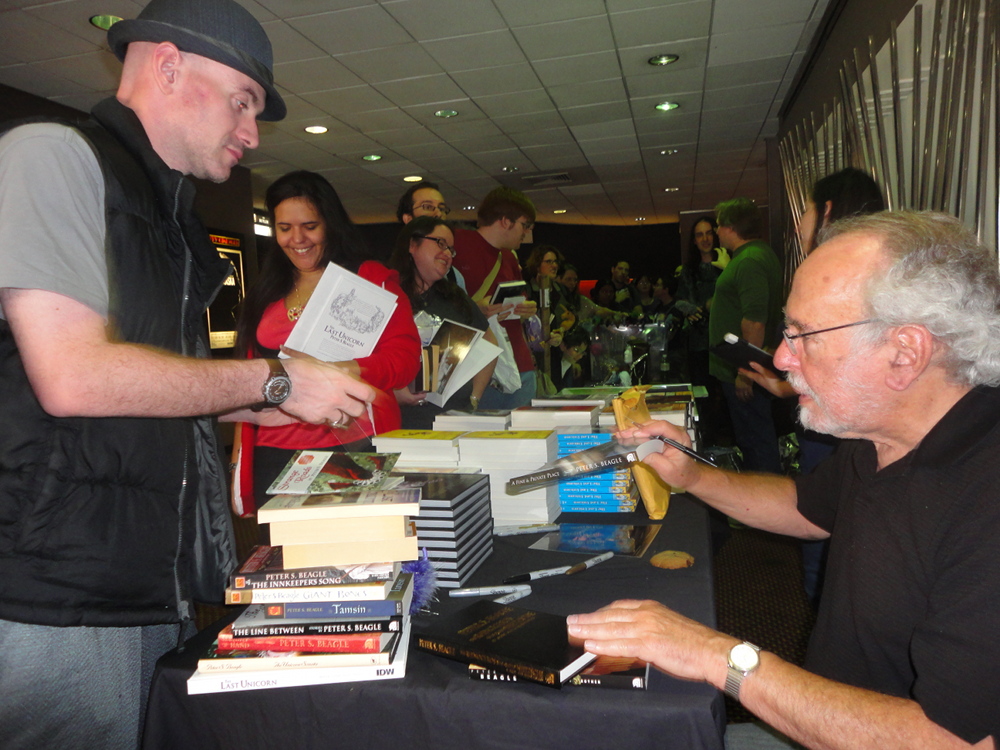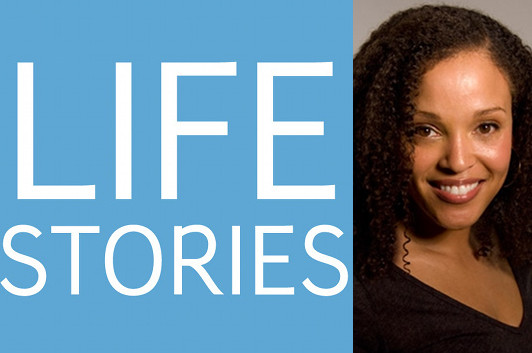Last Unicorn (& Author) Back in Theaters

Peter S. Beagle was in his late twenties when his second novel, The Last Unicorn, was published in 1968. Fourteen years later, the fantasy story was adapted into an animated film—with an all-star cast including Mia Farrow and Christopher Lee—for which Beagle wrote the screenplay. It was, he recalled as he sat in the lobby of a Manhattan movie theater on a recent Saturday afternoon, the only input he had in its making. “People saw it and would congratulate me,” he said, “but it really didn’t have much to do with me.”
That feeling was exacerbated by contractual problems where, despite being promised percentages of both the film’s net profits and the gross on related merchandising, Beagle still wasn’t seeing any income beyond his initial screenwriting fee well into the 21st century. His business manager and publisher, Connor Cochran of Conlan Press, assisted in the negotiations—eight and a half years later, though, their efforts to resolve the situation amicably still hadn’t gotten anywhere. But then, as they began preparing to file a lawsuit in 2010, Scottish businessman Adam Crozier became the new CEO of ITV, the British media conglomerate that owned the company that had made the movie and Cochran saw an opportunity.
“Here was a fellow who had no reason to cover anyone’s ass,” he recalled; his efforts to reach out to Crozier eventually led to a meeting with the firm’s head of legal, Andrew Garard. When they met later that year, “half of the first meeting was Peter and Andrew geeking out about their favorite authors.” It didn’t take long for them to strike a deal aimed at reconciling all the various rights—Beagle had the gaming rights to the novel, for example, but they were virtually useless when separated from ITV’s rights to the likenesses of the film’s versions of the characters—to everyone’s profit.
13 October 2013 | uncategorized |
Life Stories #44: Jesmyn Ward
Subscribe to Life Stories in iTunes
Two years ago, I met Jesmyn Ward just after she’d won the National Book Award for her second novel, Salvage the Bones. Up until then, she and her publisher had had a hard time getting the mainstream literary media to take a look at her work—a situation that’s happily improved for her new memoir, Men We Reaped.
In this episode of Life Stories, we talk about why Ward says writing this memoir, which is not just about her life but about the deaths of five young men in the poverty-stricken Mississippi community where she grew up, was the hardest thing she’s ever done, and how one of the greatest opportunities of her life—when one of the men for whom Ward’s mother worked as a maid agreed to pay her tuition at a good private school, setting her on the path to college—also put her in the direct path of some of the worst, most overt racism she’s ever faced (although perhaps not, she observes, as insidious as the systematic racism her brother dealt with in the public school system). And she explains why she hopes her infant daughter will find the world improved when she comes of age…
(Note: When Ward discusses the racism of her high school classmates, she does so with total frankness. I have chosen not to censor her use of a certain word, because it accurately reflects the ugliness and hatred directed at her. I expect hearing that word will offend some of you, but the world Ward describes is real, and ignoring it isn’t going to make it disappear.)
Listen to Life Stories #44: Jesmyn Ward (MP3 file); or download this file directly by right-clicking (Mac users, option-click). You can also subscribe to Life Stories in iTunes, where you can catch up with earlier episodes and be alerted whenever a new one is released.
7 October 2013 | life stories |


 Our Endless and Proper Work is my new book with Belt Publishing about starting (and sticking to) a productive writing practice.
Our Endless and Proper Work is my new book with Belt Publishing about starting (and sticking to) a productive writing practice. 
